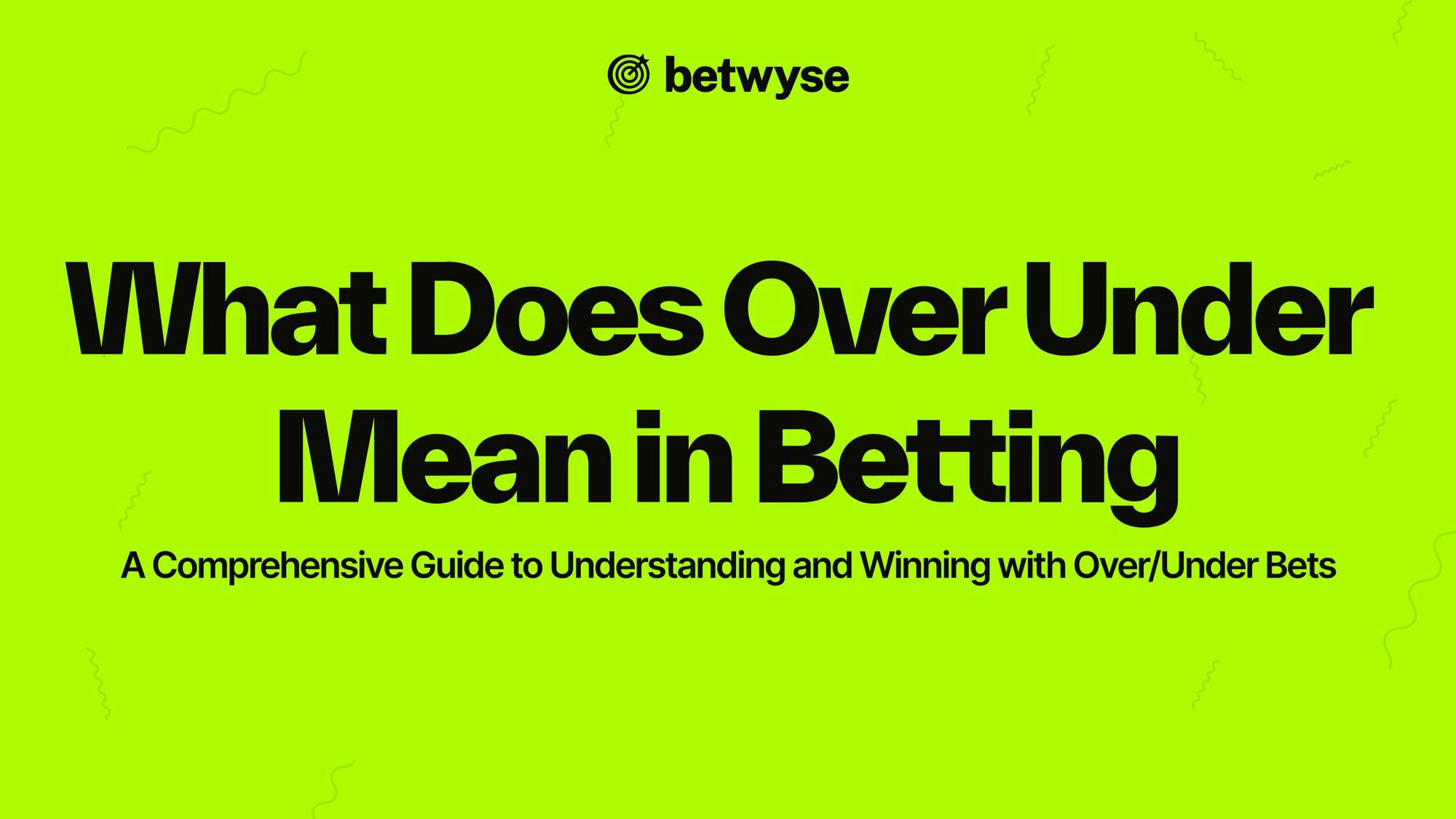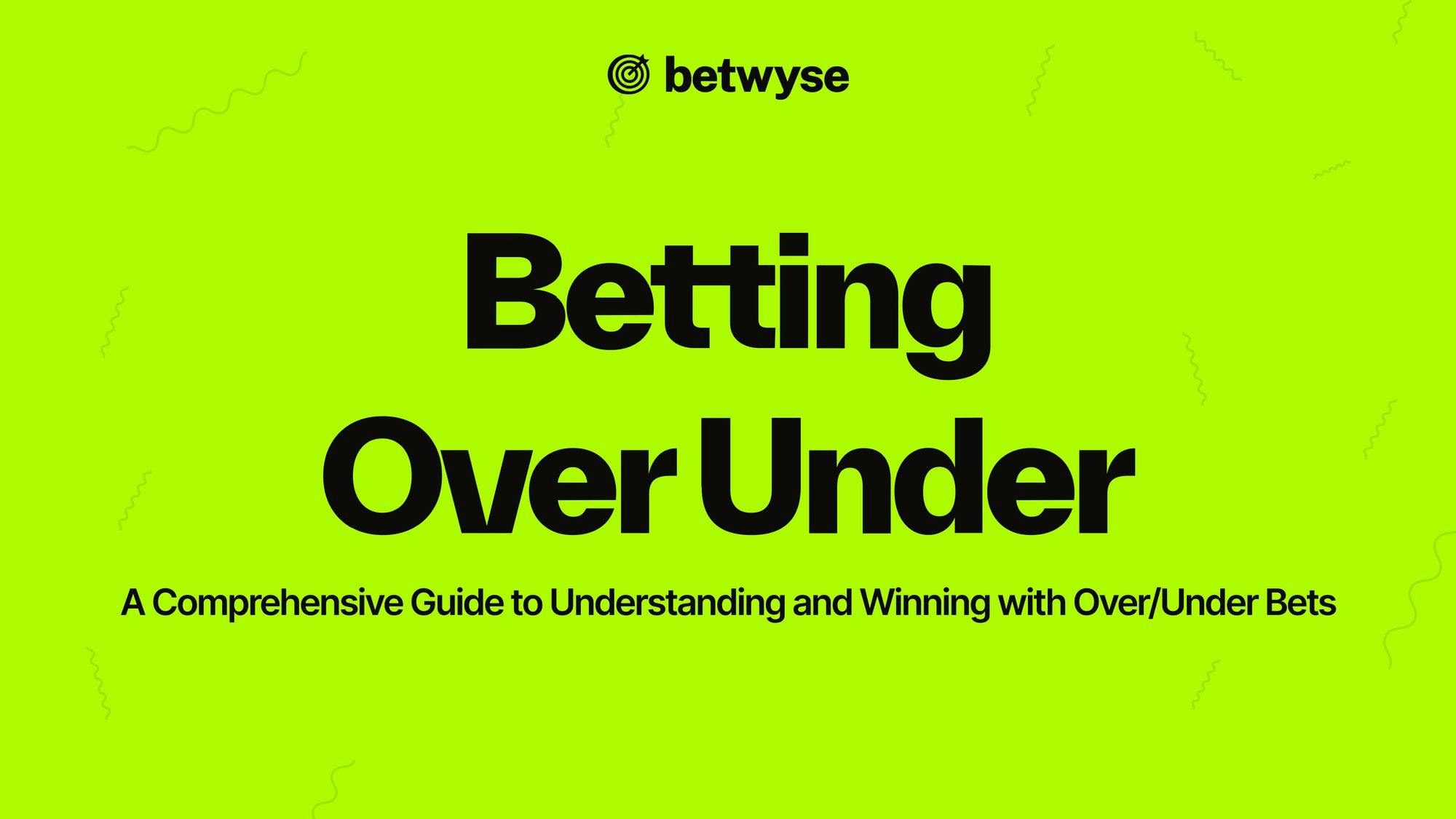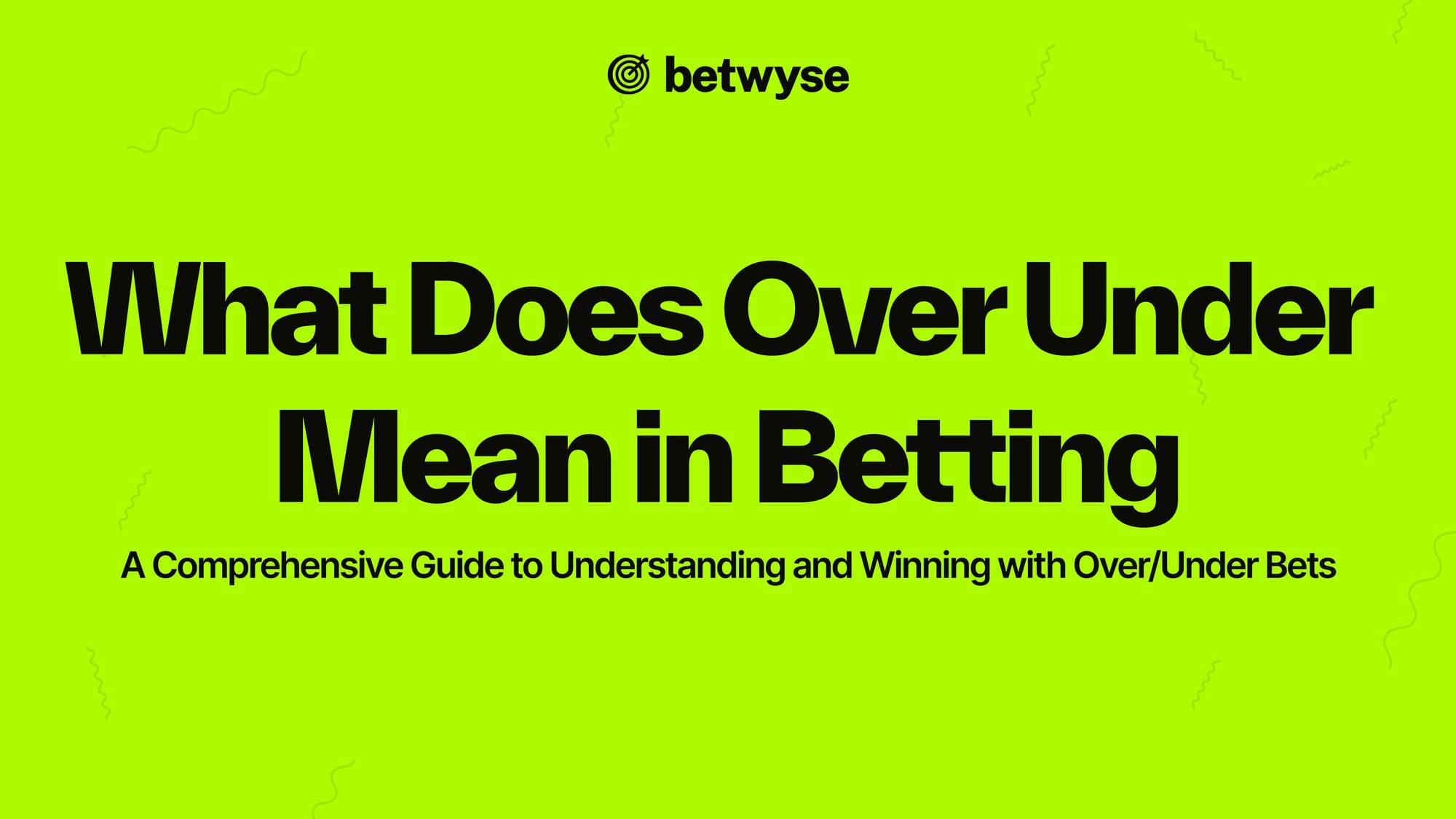If you're new to sports betting, you may have heard the term "over-under" tossed around. But what does it mean? Simply put, an over-under bet is a type of wager where you predict whether a specific statistic for a game will be higher or lower than a pre-agreed value. This type of bet is also known as a total bet.
Over-under bets are popular in many sports, including football, basketball, and baseball. For example, in football, you might bet on whether the total number of points scored by both teams will be over or under a specific number. In basketball, you might bet on whether the total number of points scored by both teams will be over or under a particular number. In baseball, you might bet on whether the total number of runs scored by both teams will be over or under a specific number.
If you're interested in sports betting, understanding over-under bets is an essential part of the process. These types of bets can be a great way to add excitement to your favorite sports games, and they can also be a way to make some money. This article looks at over-under bets, including how they work, the different types of over-under bets, and some tips for making successful over-under bets.
Understanding Over/Under Betting
Over/under betting, or totals betting, is a popular type of sports betting where you wager on the total number of points, runs, or goals scored in a game. This type of bet is available for most sports, including football, basketball, baseball, hockey, and soccer.
When you place an over/under bet, you are predicting whether the total number of points scored in the game will be over or under a specific number set by the sportsbook. This number is the "total" or "over/under." It is set by the bookmaker based on various factors, including the teams involved, the playing conditions, and the historical data.
For example, if the over/under for a basketball game is set at 200, you can bet on whether the total number of points scored will be over or under 200. If you bet on the over and the total number of points scored is 210, you win the bet. If you bet on the under and the total number of points scored is 190, you win the bet.
When you place an over/under bet, you will see two numbers listed by the sportsbook: the total and the odds. The odds indicate the payout you will receive if you win the bet. The odds for an over bet and an under bet are usually the same, but the payout may differ slightly due to the "juice" or "vig" charged by the bookmaker.
The commission that the bookmaker charges you for placing your bet is known as the juice. It is usually around 10% of the total bet amount and is included in the odds. For example, if the odds for an over bet are -110, you must bet $110 to win $100. If the odds for an under bet are -110, you must bet $110 to win $100.
In conclusion, over/under betting is a simple and popular type of sports betting where you wager on the total number of points scored in a game. It is available for most sports and offers various betting options and odds.
How Over/Under Betting Works
Over/Under betting, or totals betting, is a popular type of sports betting where you bet on whether the total number of points or goals scored in a game will be over or under a certain number. This type of bet is available for most sports, including football, basketball, soccer, and hockey.
In an over/under bet, the sportsbook sets a total number of points or goals they think will be scored in the game, and you bet on whether the actual total will be over or under that number. For example, if the total for a football game is 45.5 points, you can bet on whether the total number of points scored by both teams will be over or under 45.5 points.
If you bet on the over, you win if the total number of points scored by both teams is higher than the total set by the sportsbook. If you bet on the under, you win if the total number of points scored by both teams is lower than the total set by the sportsbook.
Over/Under bets are usually offered with a money line, which indicates the odds of winning the bet. The money line for an over/under bet is usually set at -110, meaning you must bet $110 to win $100. This is also known as vigor or juice.
It's important to note that the total set by the sportsbook can change before the game starts based on factors like injuries, weather conditions, and betting patterns. It's a good idea to monitor the total and any changes that may occur.
In summary, over/under betting is a simple and popular type of sports betting where you bet on whether the total number of points or goals scored in a game will be over or under a certain number. The money line for an over/under bet is usually set at -110, and the total set by the sportsbook can change before the game starts.
Key Factors in Over/Under Betting
Over/Under betting, also known as totals betting, is a popular type of wager that involves predicting whether the combined score of a game or event will be higher or lower than a predetermined number. Here are some key factors to consider when making over/under bets:
- Statistics and Trends: When making an over/under bet, it is vital to consider the statistics and trends of the teams or players involved. Look at factors such as offensive and defensive efficiency, points per game, yards per play, and turnovers to help you predict the final score.
- Weather: Weather conditions can have a significant impact on the final score of a game, particularly in outdoor sports like football, baseball, and hockey. Windy conditions can make it harder for quarterbacks to throw the ball. In contrast, rain or snow can make the field slippery and affect players' ability to catch and hold onto the ball.
- Injuries and Suspensions: Injuries and suspensions can significantly impact a team's performance and affect the final score of a game. Keep an eye on injury reports and factor in any key players who may be out or playing through an injury.
- Offenses and Defenses: The offensive and defensive capabilities of the teams involved can also affect the final score of a game. Look at factors such as points scored and allowed per game and the success rates of specific offensive and defensive plays to help you predict the final score.
- Point Spreads and Moneylines: When making an over/under bet, it is important to consider the point spread and moneyline for the game. The point spread is the margin of victory the favorite team is expected to win, while the moneyline is a bet on which team will win the game outright.
- Props and Wagers: Over/under bets can be combined with other props and wagers to create more complex betting strategies. For example, you could make an over/under bet on the total number of touchdowns scored in a game, combined with a prop bet on which team will score first.
- Whole Numbers and Half Points: Over/under bets are typically set at a whole number, but some sportsbooks may offer half-point lines to avoid ties. When betting on a half-point line, it is important to consider the impact a half-point could have on the final score.
- NBA Betting Totals: In basketball, the total number of points scored by both teams is typically the basis for setting the over/under bets. However, some sportsbooks may offer over/under bets on individual player statistics such as assists, blocks, and steals.
Overall, making successful over/under bets requires research, analysis, and a bit of luck. Considering these key factors and doing your homework can increase your chances of making profitable over/under bets.
The Role of Sportsbooks in Over/Under Betting
When it comes to over/underbetting, sportsbooks play a crucial role. They are responsible for setting the lines and odds for each game, which determines the total score that bettors can wager on.
Sportsbooks use a combination of statistical analysis, historical data, and expert opinion to determine the line and odds for each game. The line is set at a specific number, representing the estimated total score for the game. Bettors can then bet on whether the total score will be over or under that number.
In addition to setting the line, sportsbooks also determine the odds for each bet. The odds represent the payout for a winning bet and are usually expressed as a ratio. For example, if the odds are 2:1, a winning bet of $100 would result in a payout of $200.
Sportsbooks also charge a commission, known as juice or vig, on each bet. This commission is typically around 10% of the total wager and is how sportsbooks profit.
Sportsbooks play a critical role in over/under betting by setting the lines and odds for each game. Their expertise and analysis determine the estimated total score, which bettors can wager on.
Over/Under Betting Strategies
When it comes to over- or under-betting, there are several strategies that you can use to increase your chances of winning. Here are a few tips and tricks to keep in mind:
- Please do your research. Before placing any bets, it's important to research and analyze the statistics. Look at the teams' past performances, trends, and relevant injuries or suspensions.
- Predict the score: Instead of betting on whether the total score will be over or under a certain number, try to predict the score. This can be a more challenging strategy, but it can also result in bigger payouts.
- Consider the weather: Weather conditions can have a big impact on the outcome of a game, especially in outdoor sports like football or baseball. Keep an eye on the forecast and adjust your bets accordingly.
- Look for value: Don't just bet on the most popular or well-known teams. Look for value in the underdogs or lesser-known teams that may have a better chance of winning or beating the spread.
- Set a budget: As with any form of gambling, it's important to set a budget and stick to it. Only chase losses or bet what you can afford to lose.
If you're struggling with a gambling problem, seeking help is important. The National Council on Problem Gambling offers a confidential helpline at 1-800-522-4700.
Understanding Payouts in Over/Under Betting
Regarding over- or under-betting, the payout structure is usually straightforward. Most over/under bets have a flat rate of -110 on both the over and under. For each $100 you bet to win, you must wager $110 or more.
For example, if you bet $110 on the over and win, you would receive $100 in winnings plus your original $110 bet back, for a total payout of $210. If you bet $110 on the under and win, you would receive $100 in winnings plus your original $110 bet back for a total payout of $210.
It's important to note that the payout for over/under bets can vary depending on the sportsbook and the specific game you are betting on. Be sure to check the payout structure before placing your bet.
When it comes to over/under bets, the moneyline is not a factor. The only thing that matters is whether the final score is over or under the predetermined total. If the final score is exactly on the total, the bet is considered a push, and all bets are refunded.
To have a winning bet, you must correctly predict whether the final score will be over or under the predetermined total. Researching and considering factors such as team statistics, weather conditions, and injuries is important before making your bet.
Understanding the payout structure in over/under betting is crucial to making informed bets and maximizing your potential winnings.
Frequently Asked Questions
What is an over-under-bet example?
An over/under bet is a type of sports betting where you wager on whether the total number of points scored in a game will be over or under a certain number. For example, if the over/under for a basketball game is set at 200, you can bet on whether the total number of points scored will be over or under 200.
How do you win over and under a bet?
To win an over/under bet, you must correctly predict whether the total number of points scored in a game will be over or under the number set by the sportsbook. You win if you bet on the over, and the total number of points scored is higher than the number the sportsbook sets. You win if you bet on the under, and the total number of points scored is lower than the number the sportsbook sets.
What does +150 mean in betting?
In sports betting, +150 is a moneyline odds format representing the money you would win if you bet $100. A +150 moneyline means that if you bet $100 and your bet wins, you would receive $150 in winnings plus your original $100 bet back.
What does +12.5 mean in sports betting?
In sports betting, +12.5 is a point spread representing the number of points an underdog team is given before the start of a game. If you bet on the underdog team with a +12.5 point spread, you win your bet if the underdog team either wins the game outright or loses by less than 12.5 points.
What happens if you tie the over/under in a parlay?
If you tie the over/under in a parlay, your bet is graded as a push, and your stake is returned to you. When the total number of points scored in a game is exactly equal to the figure the sportsbook sets, a push occurs.
What is an over/under calculator?
An over/under calculator is a tool that helps you calculate the potential payout of an over/under bet. You input the total number of points scored in a game and the over/under line set by the sportsbook, and the calculator will tell you whether your bet is a winner or a loser and how much money you stand to win or lose.



